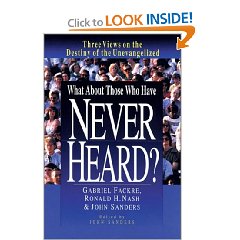Fackre, Gabriel, Ronald H. Nash, and John Sanders. Edited by John Sanders. What About Those Who Have Never Heard: Three Views on the Destiny of the Unevangelized. Downers Grove, IL: InterVarsity Press, 1995. 155 pp.
By Chris Hefner
INTRODUCTION
The question,“What about those who have never heard the Gospel?” is one of the most popular being asked by thoughtful Christians. Indeed, this question has been addressed by many theologians since the birth of Christianity. This book is an attempt to discuss some of the best theological answers to this question. Three authors promoted and critiqued the various positions leaving the reader with an opportunity at an informed view.
SUMMARY
This book clearly delineated the various theological positions concerning destiny of those who have never heard the Gospel. John Sanders was the editor of the book and also promoter of the inclusivist position. Essentially, he argued for the idea that salvation, while through Jesus Christ, can be found in an overarching faith principle. This faith principle was the means of salvation for both Old Testament believers and those across the world today who genuinely seek God, but may never hear the message of the Gospel. Gabriel Fackre presented the position of divine perseverance. Essentially, this view states that those who have not had a chance to accept or reject Christ here on earth will receive that opportunity at some point after death. He used 1 Peter 3 & 4, where Christ preached to those in captivity, as the foundation for his argument. Ronald Nash argued for the restrictivist position concerning the unevangelized. Nash mainly structured his position by discussing at length the weaknesses in the other two positions. After each section, the other two authors presented their critique of the position discussed in the chapter.
CRITICAL ANALYSIS
This book certainly stimulates those who are bent to philosophical discussions concerning the issue of those who have never heard the Gospel. For any thoughtful believer, the destiny of the unevangelized is an issue that must be grappled with. The truth concerning the ability or inability of those who have never heard to have a relationship with God based on the availability of the information of the Gospel is not to be taken lightly.
One thing I appreciated about this book was the candid, but not mean-spirited, tone each author displayed. Sanders and Fackre related compassionate and logical answers to the issue. Both began with a God who desired the salvation of everyone. Sanders presented an overall faith principle based on the work of Christ on the cross as the means of salvation for the unevangelized. He connected the means of salvation from Old Testament believers to those today and in ages past who have never heard the Gospel. Fackre suggested that those who have never heard might have the opportunity after death to accept or reject Christ. He used an obscure passage in 1 Peter 3 & 4 as the foundation for his view. Nash did not offer a clearly defined stance, but rather pointed out the weaknesses of Sanders’ and Fackre’s positions. However, Nash effectively laid out the scriptural basis for the restrictivist view. As a compassionate Christian, I would like to be able to adopt Sanders’ or Fackre’s positions or a combination of the two. However, as a student of God’s Word, I am left with the Bible being my guide and parameter for theological understanding. Constrained to that reality, inclusivism and divine perseverance, or post-mortem salvation, are weak biblically. Both stances either stretched biblical interpretation or failed to build solid biblical argumentation. Sanders and Fackre also failed to address passages of scripture that stood in stark contrast to their viewpoints. While Nash’s view was more critical toward the other two positions than constructive concerning the restrictivist position, it was very clearly biblical and grounded in solid interpretation.
CONCLUSION
For the pastor, minister, or thoughtful believer, I would encourage you to read this book. I believe that it will be helpful in dissecting a relevant biblical issue as well as defining various philosophical and interpretive terms and positions. In the end, this short book provides the starting point for the reader to discern and discover the most biblical view.


